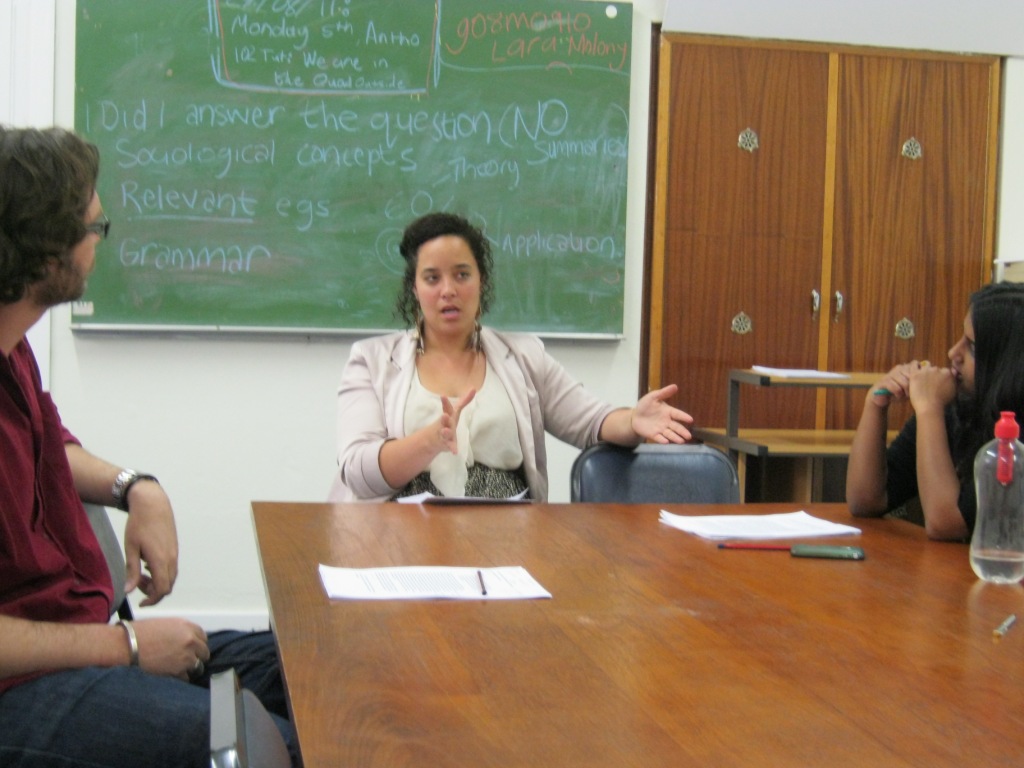
Politics Masters student, Danielle Bowler, wrote a paper exploring contested constructions of colouredness, after being incensed by a column written by Nomakula “Kuli” Roberts in a Sunday paper.
In a way, this was similar to what Frantz Fanon had referred to when he said he wrote Black Skin, White Masks after “the fire had cooled”.
An in-depth dialogue ensued when Ms Bowler, who co-wrote the paper entitled “Contested constructions of colouredness in the Kuli Roberts saga” with Prof Louise Vincent, her lecturer, discussed the paper with a small group of her peers at a seminar at the Sociology department on Wednesday afternoon.
Jou Ma se Kinders: eish, I miss daai lippies vannie Kaap was published on 20 February in The Sunday World as part of Roberts’s weekly Bitch’s Brew column.
Bowler describes Robert’s portrayal of Cape coloured women in her column as “a weak attempt at satire” and “summons every available crass stereotype: coloured women are cigarette smoking, beer swilling, drug-abusing, street fighting promiscuous drunks who wear hair curlers in public and have no front teeth”.
The nation-wide discussion responding to the column, both online and in the media, highlighted how stereotypes about coloured people are still extensively in use which creates “ tension between reifying or rejecting” those stereotypes.
Jimmy Manyi’s subsequent comment that there is an “over-supply” of coloured people in the Western Cape- and suggesting re-location- significantly strengthened the acerbity of the debate.
Bowler and Vincent chose the following quote by Grant Farred to preface the introduction of the paper, forming the central argument: “The concept of colouredness and its effects, the way in which it informs the thinking, political responses, the voting tendencies, the cultural particularities, the divided, bifurcated racial consciousness of this South African constituency can only be understood if it is publically ‘debated’, ‘extended’ (in the sense that it is subjected to a demanding intellectual interrogation) and ‘quarrelled’ over and over again.”
Bowler therefore argues: “Contemporary race thinking should be debated to dispel voluntary or involuntary representations, which masquerade as ‘common-sense’ classifications, which results in people experiencing themselves as racial subjects.”
She feels this is compounded by how, when race is mentioned, one generally thinks of or refers to a black/white binary.
Using a metaphor employed by Farred in The Midfielders Moment, (2000), likening coloureds to midfielders in a soccer team, Bowler questions the “in between nature” of being coloured.
“The metaphor aptly summarises common sense constructions of coloured identity: coloureds are seen to occupy the midfield of a racial continuum with white people on one extreme of the continuum and black people on the other.”
The intricacies of their tenuous position is further realised in how “contemporary South Africa middleness, ironically, now also suffers from the opposite effect: in programmes of redress and political and economic empowerment some coloureds now experience themselves as not quite black enough, damned in part by the dubious and meagre privileges of being treated as coloured rather than ‘black’ by apartheid’s architects.”
Mentioning a popular song from Brazil, the title of which loosely translates as ‘Everyone has a bit of colour in them’ she again emphasised how it is important that coloured people decide how they want to be defined as it is only through self-definition, introspection and debate that there can be a real interrogation of what being coloured in contemporary South Africa means.
Story and picture by Anna-Karien Otto
